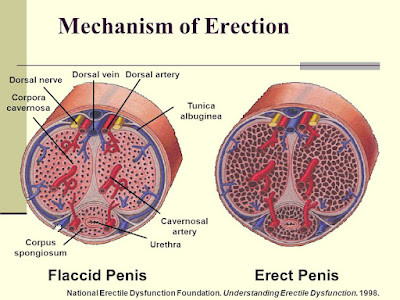What is erectile dysfunction?
Erectile dysfunction, also known as ED or impotence, is the inability to achieve or maintain an erection sufficient for the sexual satisfaction of both partners. It can devastate the self-esteem of a man and his partner. About 30 million American men continue to be affected, and transient episodes affect nearly all adult men. But almost all men who seek treatment find some relief.
What causes erectile dysfunction?
Just 20 years ago, doctors often attributed it to psychological problems or, in the case of older men, to the aging process.
Today, the pendulum of medical opinion has swung away from both notions. Although stimulation takes longer as a man ages, chronic erectile dysfunction requires medical attention. Also, the difficulty is not always from the psychological origin. Today, urologists believe that physical factors cause the majority of erectile dysfunction in men over 50 years of age.
Erectile dysfunction in old men
Since the penile errection mainly includes blood vessels, it is not surprising that the most common cause in adults is a condition that restricts blood flow to the genitals, such as atherosclerosis or diabetes. Another vascular cause can be an abnormal vein, which causes blood to flow out of the penis too quickly. Other physical problems, as well as hormonal imbalances and certain functions, can also cause erectile dysfunction.
The vascular system that makes up the erection is controlled by the nervous system, some drugs that can have the side effect of interfering with important nerve signals. The Potential triggers include many stimulants, sedatives, diuretics, antihistamines, and medications that treat high blood pressure, cancer, or depression. But don't stop the medicine unless your doctor tells you to. Also, alcohol, tobacco, and illegal drugs, such as marijuana, can interfere with performance.
Erectile dysfunction in young men
In young men, psychological factors are the most common cause of erectile dysfunction. Conflict and anxiety can result from wrong communication with a partner or from differences in sexual preferences. Sexual difficulties can be associated with the following:
- Depression
- Anxiety
- Fatigue
- Rejection by parents or peers
- Feelings of inadequacy
- Personal sexual fears
- Childhood sexual abuse
What is impotence?
Impotence is a condition that systematically affects a person's ability to have or maintain an erection, or their ability to achieve ejaculation. It is a type of erectile dysfunction (ED).
There can be many causes of impotence. These include both emotional and physical problems. According to the Merck Manual, about 50% of men between the ages of 40 and 70 experience erectile dysfunction at one time or another.
The risk of impotence increases with age.
It was also found that more educated men were less likely to suffer, possibly because they lived a better life on average. Impotence often has a negative impact on sex life and can cause additional stress, depression and low self-esteem.Impotence can change a person's life and destroy self-esteem. Although aging is often associated with erectile dysfunction, aging is not necessarily one of the causes of impotence. Erectile dysfunction is not considered a natural part of aging. Aging is just one dangerous thing. Some people never experience impotence.
Although erectile dysfunction can have a negative impact on sex life, it is a treatable condition. There are many programs that can help a person regain sexual function, including physical therapy, medication and lifestyle changes.
Because impotence can indicate an underlying health problem, make an appointment with your doctor if it becomes a regular problem, even if you think it's just stress.
Is erectile dysfunction inevitable?
Erectile dysfunction (ED) is the inability to achieve or maintain an adequate erection for sexual intercourse. Some people may feel that ED increases with age. The thing is, the impotence and inability to maintain the errection is not affected by age. Getting older doesn't mean you have to lose erectile function forever. Although age can increase the risk of erectile dysfunction, there are ways to treat it.
Male sexual arousal may seem simple, but it is based on a precise and complex sequence of events in the body. The brain activates the nerves in the penis to relax the spongy tissue muscles that run down the penis. When these muscles relax, blood can flow through the arteries and fill the open spaces within the spongy tissue.
The increase in blood pressure expands the penis. The membranes around the spongy tissue support the erection. Anything that interrupts this sequence can result in the inability to get or maintain an erection long enough to have sex.
Age factors
No matter your age, Erectile dysfunction is often associated with aging. Although the frequency of erectile dysfunction increases with age, it is treatable regardless of your condition and is not as inevitable as you might think.According to Johns Hopkins Medicine, it is estimated that only 4% of men in their 50s and 17% of men in their 60s experience a complete inability to get an erection. In fact, erectile dysfunction can have many causes not associated with aging.
Medical causes of erectile dysfunction
There are many physical causes of erectile dysfunction. Any of these can interrupt the sequence of physiological changes that produces an erection:
- Obesity
- Diabetes
- Heart disease
- Hypertension (high blood pressure)
- High cholesterol
- Low testosterone level
- Enlarged prostate
- Sleep disorders, such as sleep apnea
- Multiple sclerosis
- Parkinson's disease
Psychological causes of erectile dysfunction
- Depression: Depression can interfere with a man's sexual desire and ability to get and maintain an erection.
- Anxiety: Anxiety, particularly performance anxiety, can cause a man to experience ED.
- Stress: Chronic stress can interfere with a man's sexual performance and lead to ED.
- Relationship problems: Issues in a man's relationship, such as conflicts, stress, and dissatisfaction, can cause ED.
- Low self-esteem: Men who have low self-esteem or who feel insecure about their sexual performance may experience ED.
- Past sexual trauma: A history of sexual trauma, such as sexual abuse or assault, can contribute to ED.
- Mental health disorders: Mental health disorders, such as anxiety, depression, and PTSD, can also contribute to ED.
What are the treatments for erectile dysfunction?
- Medications: Oral medications such as sildenafil (Viagra), tadalafil (Cialis), and vardenafil (Levitra) can help improve blood flow to the penis and enhance the ability to achieve and maintain an erection.
- Vacuum devices: These devices are designed to draw blood into the penis and create an erection.
- Penile injections: Intracavernosal injections of alprostadil or a combination of drugs can help achieve and maintain an erection.
- Penile implants: A penile implant is a surgical option for men who are unable to achieve an erection with other treatments.
- Hormone therapy: Low levels of testosterone can contribute to ED, and testosterone replacement therapy may be recommended.
- Lifestyle changes: Making changes to lifestyle habits, such as quitting smoking, losing weight, and exercising regularly, can help improve ED.
- Psychotherapy: Talking to a therapist or counselor can help address psychological factors that contribute to ED and improve sexual function.
So, there you have it – the lowdown on ED. It may not be the most enjoyable issue, but it must be addressed. So, whether you're a male coping with ED or just want to brush up on your knowledge, maybe this post has given you some useful information. And don't give up hope if you have ED - with the correct strategy and treatment plan, you can get back in the game and leave your "you know what" in the dust. Let's hope it doesn't turn out like a "limp noodle."


















